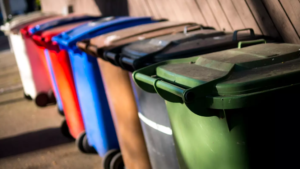Government Announces New Recycling Rules: Every UK Household to Have Four Bins
The UK government has unveiled new recycling regulations that will require every household to use four separate bins for waste disposal. The initiative aims to standardise waste collection across England and increase recycling rates to meet environmental targets. The new system, expected to be fully implemented by 2026, will apply to all local authorities and households, regardless of their existing arrangements.
What Are the New Bin Requirements?
Under the new rules, households will be required to separate their waste into the following four categories:
- Food Waste – A dedicated bin for leftover food, vegetable peelings, and other compostable materials.
- Dry Recyclables – This includes paper, cardboard, plastic, glass, and metal, which will be collected separately from other waste streams.
- Garden Waste – A bin specifically for garden clippings, leaves, and plant matter, ensuring it is composted properly.
- Residual Waste – All non-recyclable and non-compostable waste, which will go to landfill or incineration facilities.
Why Is This Change Being Introduced?
The government has stated that the changes are part of a broader environmental strategy to improve recycling efficiency, reduce landfill waste, and lower carbon emissions. Currently, recycling rates in England have stagnated at around 44%, far from the government’s target of 65% by 2035. The new system is expected to encourage better waste sorting and improve the quality of recyclable materials, making them easier to process and reuse.
Additionally, the initiative aligns with the Environment Act 2021, which includes provisions to reduce plastic waste and promote a more circular economy. By streamlining collection methods across all councils, the government hopes to eliminate the inconsistencies that have led to confusion among residents and varying levels of recycling success.
Concerns and Challenges
While the new rules have been welcomed by environmental groups, some councils and residents have raised concerns about the practicality of the four-bin system. One of the main issues is space—many urban households, particularly those in flats or smaller homes, may struggle to store multiple bins.
There are also concerns about the cost of implementation. Local councils will need to invest in new bins, collection vehicles, and waste processing facilities. Some councils have warned that these costs could lead to higher council tax bills if not fully funded by the government.
Another challenge is ensuring compliance. Some critics argue that requiring residents to separate waste into multiple bins could lead to confusion and non-compliance. Public awareness campaigns and clear guidelines will be essential to ensure a smooth transition.
What Happens Next?
The government has pledged financial support to councils to help them transition to the new system. A phased rollout is expected, with some areas implementing the new bin system as early as 2025. Households will receive guidance on how to use the new bins effectively, and local authorities will provide clear schedules for waste collection.
As the UK moves towards a greener future, the new four-bin system represents a significant step in improving the country’s recycling efforts. Whether it will achieve its intended goals remains to be seen, but for now, UK households should start preparing for a major change in how they manage their waste.


